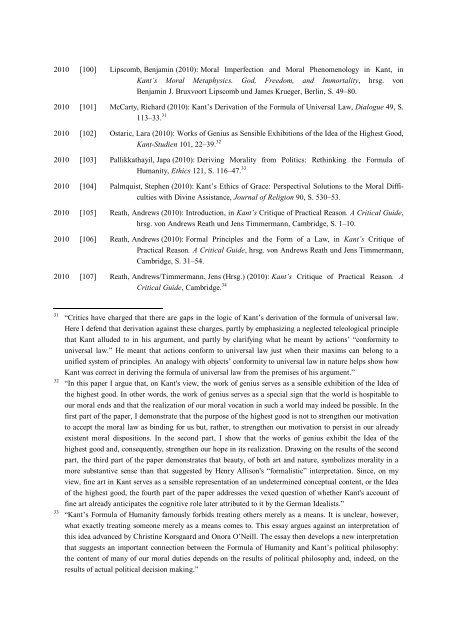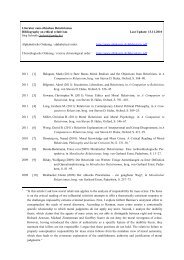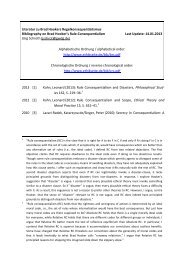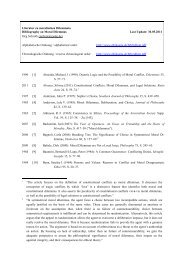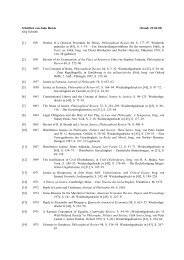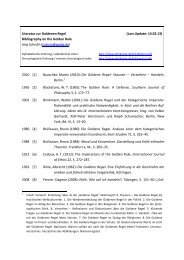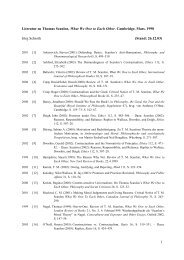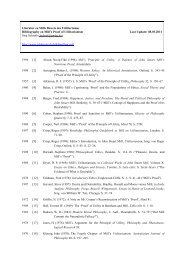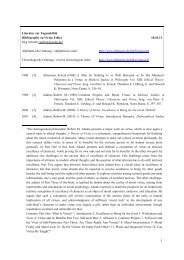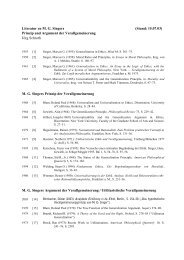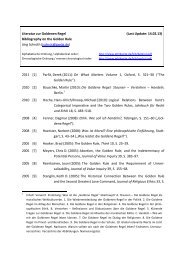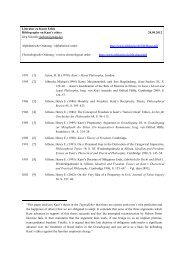Chronologische - Ethikseite
Chronologische - Ethikseite
Chronologische - Ethikseite
You also want an ePaper? Increase the reach of your titles
YUMPU automatically turns print PDFs into web optimized ePapers that Google loves.
2010 [100] Lipscomb, Benjamin (2010): Moral Imperfection and Moral Phenomenology in Kant, in<br />
Kant’s Moral Metaphysics. God, Freedom, and Immortality, hrsg. von<br />
Benjamin J. Bruxvoort Lipscomb und James Krueger, Berlin, S. 49–80.<br />
2010 [101] McCarty, Richard (2010): Kant’s Derivation of the Formula of Universal Law, Dialogue 49, S.<br />
113–33. 31<br />
2010 [102] Ostaric, Lara (2010): Works of Genius as Sensible Exhibitions of the Idea of the Highest Good,<br />
Kant-Studien 101, 22–39. 32<br />
2010 [103] Pallikkathayil, Japa (2010): Deriving Morality from Politics: Rethinking the Formula of<br />
Humanity, Ethics 121, S. 116–47. 33<br />
2010 [104] Palmquist, Stephen (2010): Kant’s Ethics of Grace: Perspectival Solutions to the Moral Difficulties<br />
with Divine Assistance, Journal of Religion 90, S. 530–53.<br />
2010 [105] Reath, Andrews (2010): Introduction, in Kant’s Critique of Practical Reason. A Critical Guide,<br />
hrsg. von Andrews Reath und Jens Timmermann, Cambridge, S. 1–10.<br />
2010 [106] Reath, Andrews (2010): Formal Principles and the Form of a Law, in Kant’s Critique of<br />
Practical Reason. A Critical Guide, hrsg. von Andrews Reath und Jens Timmermann,<br />
Cambridge, S. 31–54.<br />
2010 [107] Reath, Andrews/Timmermann, Jens (Hrsg.) (2010): Kant’s Critique of Practical Reason. A<br />
Critical Guide, Cambridge. 34<br />
31 “Critics have charged that there are gaps in the logic of Kant’s derivation of the formula of universal law.<br />
Here I defend that derivation against these charges, partly by emphasizing a neglected teleological principle<br />
that Kant alluded to in his argument, and partly by clarifying what he meant by actions’ “conformity to<br />
universal law.” He meant that actions conform to universal law just when their maxims can belong to a<br />
unified system of principles. An analogy with objects’ conformity to universal law in nature helps show how<br />
Kant was correct in deriving the formula of universal law from the premises of his argument.”<br />
32 “In this paper I argue that, on Kant's view, the work of genius serves as a sensible exhibition of the Idea of<br />
the highest good. In other words, the work of genius serves as a special sign that the world is hospitable to<br />
our moral ends and that the realization of our moral vocation in such a world may indeed be possible. In the<br />
first part of the paper, I demonstrate that the purpose of the highest good is not to strengthen our motivation<br />
to accept the moral law as binding for us but, rather, to strengthen our motivation to persist in our already<br />
existent moral dispositions. In the second part, I show that the works of genius exhibit the Idea of the<br />
highest good and, consequently, strengthen our hope in its realization. Drawing on the results of the second<br />
part, the third part of the paper demonstrates that beauty, of both art and nature, symbolizes morality in a<br />
more substantive sense than that suggested by Henry Allison's “formalistic” interpretation. Since, on my<br />
view, fine art in Kant serves as a sensible representation of an undetermined conceptual content, or the Idea<br />
of the highest good, the fourth part of the paper addresses the vexed question of whether Kant's account of<br />
fine art already anticipates the cognitive role later attributed to it by the German Idealists.”<br />
33 “Kant’s Formula of Humanity famously forbids treating others merely as a means. It is unclear, however,<br />
what exactly treating someone merely as a means comes to. This essay argues against an interpretation of<br />
this idea advanced by Christine Korsgaard and Onora O’Neill. The essay then develops a new interpretation<br />
that suggests an important connection between the Formula of Humanity and Kant’s political philosophy:<br />
the content of many of our moral duties depends on the results of political philosophy and, indeed, on the<br />
results of actual political decision making.”


